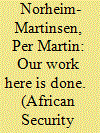|
|
|
Sort Order |
|
|
|
Items / Page
|
|
|
|
|
|
|
| Srl | Item |
| 1 |
ID:
181300


|
|
|
|
|
| Summary/Abstract |
The Federal Bureau of Investigation (FBI), although it is a domestically oriented intelligence service, must contend with foreign state, terrorist, and criminal entities. Foreign language capability is integral to countering many of these threat actors. The FBI has developed its foreign language workforce and associated infrastructure in response to the evolution of its mission. This was a learning process for the FBI and progressed from utilization of personnel who had language skills, or who were trained on an ad hoc basis, to establishing a dedicated workforce of linguists. This evolution highlights the need for organizations to assess needs and build toward workforces defined by subject matter expertise, rather than taking a one-size-fits-all approach. As the FBI’s history in the field of language illustrates, expertise will eventually become a necessity. Workarounds, whether in language, information technology, or any other field, will only ultimately delay the development of capabilities.
|
|
|
|
|
|
|
|
|
|
|
|
|
|
|
|
| 2 |
ID:
096700


|
|
|
|
|
| Publication |
2010.
|
| Summary/Abstract |
This article examines the British Army's deployment in support of the civil power in Northern Ireland. It argues that the core guiding principles of the British approach to counterinsurgency (COIN) - employing the minimum use of force, firm and timely action, and unity of control in civil-military relations - were misapplied by the Army in its haste to combat Irish Republican Army (IRA) terrorism between 1971 and 1976. Moreover, it suggests that the Army's COIN strategy was unsuccessful in the 1970s because commanders adhered too closely to the customs, doctrine, and drill applied under very different circumstances in Aden between 1963 and 1967, generally regarded as a failure in Britain's post-war internal security operations. The article concludes with a discussion of the British government's decision to scale back the Army's role in favour of giving the Royal Ulster Constabulary primacy in counter-terrorist operations, a decision which led ultimately to success in combating IRA violence.
|
|
|
|
|
|
|
|
|
|
|
|
|
|
|
|
| 3 |
ID:
106199


|
|
|
|
|
| Publication |
2011.
|
| Summary/Abstract |
Since the European Union's Organisation Operation Artemis in support of the United Nations mission in the Democratic Republic of Congo (MONUC) in 2003, Africa has become a key area of operations for the EU, an important source of lessons learned, and a test case for a constructive UN-EU partnership. The questions posed in this paper are whether the lessons learned have been the 'right' ones, and whether the hopes that the EU would become a vehicle for a revival of European peacekeeping in Africa have been met. The paper shows that despite initial hopes that it would become an active and responsible peacekeeper, the EU's African venture soon showed signs of strain. Routine claims to success, and a need to prove itself as a potent military actor, have made it hard for the EU to learn the right lessons from these operations and develop relations with the UN. A further problem is that the EU, through its short-term 'bridging operations', subsequently often increases the strain on the UN. Finally, the potential for drawing synergies between both organisations' unique potentials as civil-military actors has not been tapped.
|
|
|
|
|
|
|
|
|
|
|
|
|
|
|
|
| 4 |
ID:
122695


|
|
|
|
|
| Publication |
2012.
|
| Summary/Abstract |
The chief of land forces (Belgium) in the member of representative counties detail the reform processes through which their services are adapting their respective structures, equipment and doctrines to the new requirements of our times.
|
|
|
|
|
|
|
|
|
|
|
|
|
|
|
|
| 5 |
ID:
122703


|
|
|
|
|
| Publication |
2012.
|
| Summary/Abstract |
The chief of land forces (Italy) in the member of representative counties detail the reform processes through which their services are adapting their respective structures, equipment and doctrines to the new requirements of our times.
The Italian Army-Playing an Important role in International Operations
|
|
|
|
|
|
|
|
|
|
|
|
|
|
|
|
|
|
|
|
|